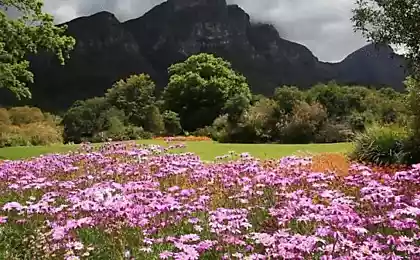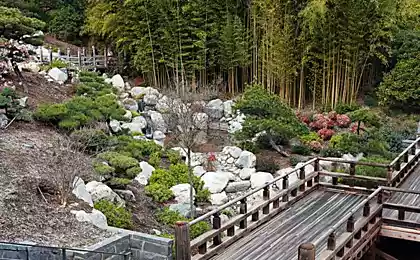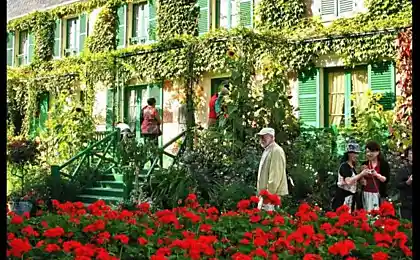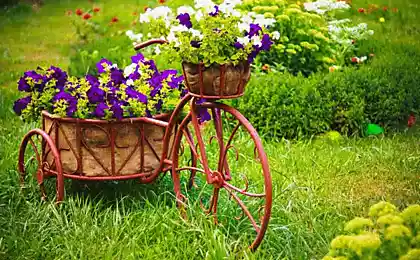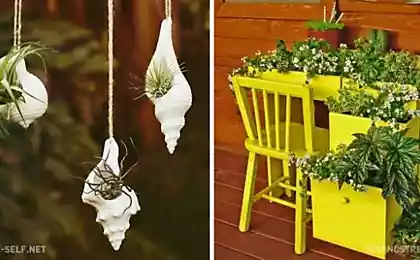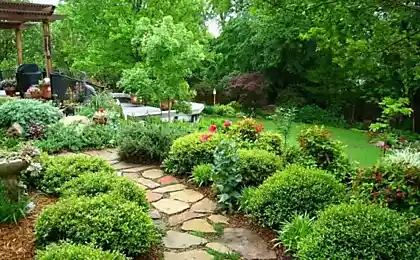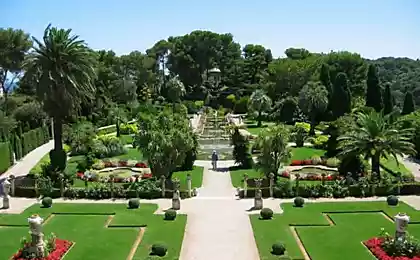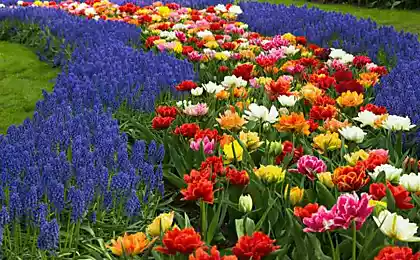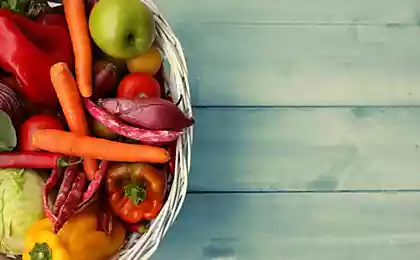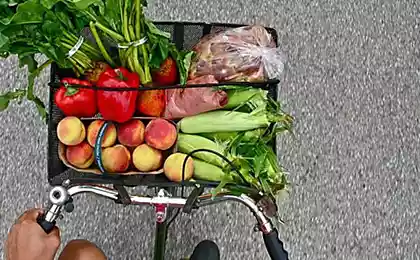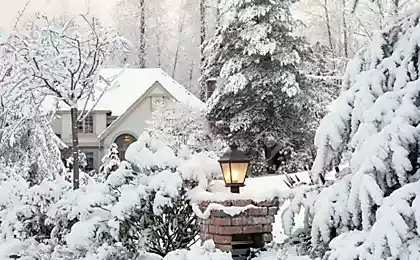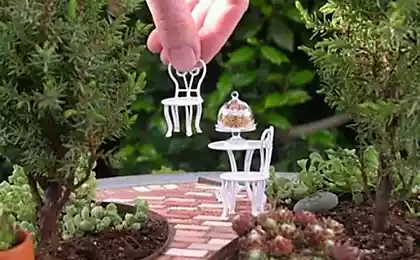455
Pesticides - NO!
Modern human nature is very afraid and diseases in their plants. And people believe that the only reliable remedy against pests is pesticides. Despite the fact that all without exception are melting their harm, chemical toxins continue to use not only in the state and private households, but also in suburban areas. In stores you will always find a set of tools to protect plants. The citizens buy them and treat your plants. And the desired result is achieved: the bugs are paws up...
The world Outlook of the XXI century has developed in this way, and it immediately difficult to change.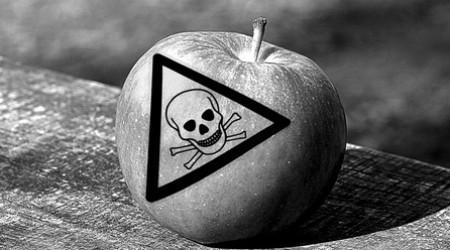
And still we manage to abandon protection chemicals, we will be able to do without them. For this there are a number of prerequisites. First, many diseases and pests, mi can understand not using "chemicals" that many do. Secondly, there are quite a lot of plant diseases that "chemistry" can not win — and still nothing bad is happening: these diseases almost do not touch us, and will not touch. And since "chemistry" is not omnipotent, then no point for her to stay. Thirdly, the chemicals appeared only a few decades ago, and before that people several thousands of years quietly bred all garden plants, and knew how to protect them. Pests and (diseases in General was never terrible, never brought devastation, except in rare cases. ***
*** The gardener, the cottager does not have to become an expert in the field of plant protection from pests and diseases. And those and others too much that we spend so much of their time. Each area has its own small set of pests and diseases that are always present. You get them over time, you learn and learn to cope with them. Everyone else to touch you almost never will. Gradually you will find something to treat plants against a particular disease. However, spraying does not always act on pests the way we expect. Your chosen funds may not have the pest in a given area of its normal action. You will have some time to experiment before you will find effective tools against their enemies. *** All the pests and diseases of garden plants taken from the wild. They live next door to us in the woods and fields. Their life is subordinated to its laws: sometimes they disappear, and sometimes there are outbreaks of. In this case, the pests so much that they RAID our gardens.In the wild, among all its "subject," there is a strict rule: no one can destroy completely. Always a considerable part needs to remain. And all adhere to this rule. Look in the woods you almost never catch the eye of holey leaves, gnawed branches. The hazel is always a lot of whole nuts, although there are wormy. Traces of various viral diseases on the leaves too almost no. Round healthy green foliage. "Pests" eat the vegetation in moderate amounts. Most remained. It always was with people, with their fields and orchards before the invention of "chemistry". *** It may seem that sometimes without pesticides not do, for example, in the case of the Colorado potato beetle. I would like to describe the situation of the Colorado potato beetle because it is very visual. Today, many Russians, including those living in cities are outside the city potato gardens, and they are well familiar with the Colorado potato beetle. Yes, the situation of the Colorado potato beetle looks catastrophic. He swoops down on the potato gardens and chrysal tops all. His poison the most deadly poisons. "If last year did not help a half-package of trichlorfon on the bucket — this will dilute the whole package in a bucket!" People walk the rows of potatoes and sprayed them with a broom. Then the bugs this garden is not touched. A small part of them dies, but the main mass will fly on the next wow childbirth, which did not etch, or poisoned for a long time, and the action of poisons is weakened. There they eat everything clean and produce offspring. In addition, the pest adapting to the poison, and even swimmablenyc areas is to graze a lot of bugs. Those individuals who did not take the strongest poisons, is the future of the Colorado potato beetle. They will give the highly resistant progeny. I describe it to show what a pointless fight people. They use stronger poisons, and bugs are becoming more and more. But people do consume their poisons. Some hope that the poison will not fall in a club or potatoes, as it does not penetrate into the soil. Others believe that the poison is decomposed under the action of sunlight... But it is well known that the leaves immediately absorb the substances that they make. And easily absorb, Rosa, based on this method foliar feeding of plants with fertilizer.
Part of the poison falls to the ground, when digging mixed with the soil for many years and then poisoning the roots. Other way people just don't see it. Everyone does what everyone does... *** meanwhile, as the potato plants that eat Colorado potato beetle, still give potatoes. Not too big, but give. I saw it with my own eyes. In villages there are gardens old single grandmothers who have no strength to care for potatoes. They even weed not, not what to spray. Beetles, as expected, come to these gardens, and eat the tops, so stick one stick... Looking at these abandoned orchards, I wanted to know if there is anything in the ground, and checked. The potatoes were on the spot, pretty decent size. I asked, does it happen that the potatoes they grow, and I was told that does not happen. Every year, the harvest. In the spring of neighbors help to plant potatoes in the fall to dig up, grandma put the bags in the cellar and live within himself. Is it possible that the tubers were grown without leaves? It turns out that the tubers have time to tie, because the Colorado beetle attack immediately, but once the tops grow. And he eats the Bush is also not right. And even in the United the Bush remains green stems, which are also capable of photosynthesis, they will nourish the root. All of this suggests that the tubers have enough time to grow. Just they will be small, with a chicken egg. The person who received a potato, of course, is unhappy, he complains that he has "all ate the bug." Now the wholesalers will not buy from him his potatoes, his budget suffered damage. All this can be understood. So we have decided to live continuously going to sacrifice for budget. And we habitually poison themselves, just to get more. At his dacha, or in the back garden, where we grow potatoes for your family, it is possible to prefer quality and to refuse to poisons. Try to plant potatoes as early as possible to the shoots grew and stayed green until the RAID bugs. ***
It is a law of nature. This can not be, that the animal did not disappear after such a long take off their numbers. The bubble always bursts. Usually after the mass dominance of some animal and then for many years of stillness, it seems that it's all gone. And within populations of the Colorado potato beetle has long been ready to self-destruction, and only we use stored feed him the Foundation, strengthening it and extending his reign. It turns out that people themselves have created untold number of Colorado potato beetle, locusts and other unexpected guests. *** Choose varieties and hybrids resistant to pests and diseases is also a way of plant protection. Making sure that some culture constantly amazes one and the same disease, you can choose varieties or hybrids resistant to this disease. In shops usually there is a wide range of varieties for each vegetable, and the seller you can get information about the resistance to diseases and pests. In General, if you are going to grow plants without chemical fertilizers and pesticides, you should follow time-tested varieties. We, of course, attract new science, and we use them. There are advanced varieties, the fruits of which are either larger, or tastier, or something else beyond or local (zoned) class. In practice it turns out that the new varieties acquire only avid gardeners, planting giving a lot of time and effort. Mostly the same people remain committed to the old varieties. And rightly so. Ordinary, local varieties are time-tested. Once they are hardy and undemanding, so close to nature, where everything is hardy and undemanding. That means that nature has included them in its rhythm, and they'll do without "chemistry". Every coin, as you know, there's always the flip side.
*** You can, of course, sometimes resort to chemical means of plant protection. But if you are one and the same culture come every year to save so, it is better from it altogether until you find a way to manage natural resources. For example, turnips can be a last resort to sow in July, after a decline of cruciferous flea beetles. Cabbage is not to be held, she needs more time to develop, but it can be protected from flea beetles and caterpillars as early as possible in planting and spraying natural infusions. Once grown cabbage in the old days! In Europe and in the middle ages, cabbage was a staple food, and it was grown everywhere. *** Some chemicals against diseases and pests have at first glance a weak toxic effect. And still better and to give them up. Once to use them a little, and is constantly used — they will accumulate in the soil. For example, copper sulfate. The first spraying they can be considered as a top dressing copper, which few in the sandy and peaty soils. But copper is firmly fixed in the upper layer of the soil, not washed away from him. Subsequent application of copper sulphate and copper oxychloride and Bordeaux mixture will result in imperceptible increase of accumulation of copper in the soil, until it begins to poison us. *** If you decide to stop spraying pesticides, don't listen to anyone's wailing about the possible loss of the entire harvest. Like, if the pests will overcome us, there will come a famine. About a possible famine may argue only people that never dealt with the land. People associated with agriculture, which has its own vegetable garden, you know that even if one died, what's left is lots and lots of whole someone else. Take his farm. You know that many vegetable, fruit and berry crops are not affected by pests, I mean that can develop individual plants, but the bulk of the harvest is always ripe. There are Apple trees are covered with apples without any care. Strawberries and currants behave the same. They rarely get sick and it was mostly after we will perekormlen their fertilizers. Very often sick plant indicates that we did something wrong. This may be the result of excess fertilizer or accidental ingress of harmful substances with compost or ash. We naru sewed internal balance of substances in the plant, and nature, as we have said, treats it as sick. And takes its own measures. I was very amazed pests of plants growing near a ditch where the water flowed from the sink. Apparently, they were poisoned detergent. Therefore, toxic chemicals, protecting against a single disease, provoke the emergence of the next.
They are only executors of the will of nature. *** I think it would be right if we refuse in General from pesticides, but sometimes, in the most extreme cases, will use it. (Would like to see such cases at all was not!) Available you re-read books or magazines where it is written about pest control. A lot of different recipes, and each author adds something of his own. Not in one, in another book you will find a harmless way to get rid of their most sworn enemy. The people are observant and creative, always think of something. I found once an article about how one grower pests are controlled only ice water — watered all the branches from a hose before leafing and after blooming. He argued that ice-cold water deters all evil, it leaves the branch. Why not to try? Other gardeners, on the contrary, watering the bushes with boiling water from a watering can before blooming of kidneys, it also removes the landing of enemies, including fungal spores. Sometimes it is an abstract event can help in the fight against pests.
For this approach balances the honey from the jar, but it has to be natural. The solution is sprayed with a broom on branches and leaves, and flock to it, a variety of insect pollinators: bees, bumblebees, various flies and wasps. They not only enhance pollination. You meet them a lot, they are accompanied by other insects, they carry on their bodies the different substances and microbes, including protective. Together they shift the biological balance and can protect the flowers from pests. ***... In may be difficult to resist, so do not rush to spray everything with strong chemicals. Indeed, when the garden had just turned green, we see that pest affected well, just everything, and it seems that this year's harvest is gone. All the leaves bitten, punctured kidneys eaten. I want to take the strong medication and... And yet this is misleading, completely misleading. All will be restored. Of course, we will help landings. But not pesticides. It suffices purely mechanical action and in the extreme case of plant extracts. They will stop the caterpillars and aphids, and soon the greens will grow at such a rate that the jaws of the caterpillars and larvae, for it is not theft. Below we will discuss ways to protect plants from common pests and diseases and provide a few recipes infusions and decoctions of herbs. They are not killing the pests polls as pesticides, but drive them away, and they find a more tasty food. All methods of combating pests and diseases for us are completely harmless.
Source: sadiogoroddlyalenivuh.blogspot.com/
The world Outlook of the XXI century has developed in this way, and it immediately difficult to change.

And still we manage to abandon protection chemicals, we will be able to do without them. For this there are a number of prerequisites. First, many diseases and pests, mi can understand not using "chemicals" that many do. Secondly, there are quite a lot of plant diseases that "chemistry" can not win — and still nothing bad is happening: these diseases almost do not touch us, and will not touch. And since "chemistry" is not omnipotent, then no point for her to stay. Thirdly, the chemicals appeared only a few decades ago, and before that people several thousands of years quietly bred all garden plants, and knew how to protect them. Pests and (diseases in General was never terrible, never brought devastation, except in rare cases. ***
*** The gardener, the cottager does not have to become an expert in the field of plant protection from pests and diseases. And those and others too much that we spend so much of their time. Each area has its own small set of pests and diseases that are always present. You get them over time, you learn and learn to cope with them. Everyone else to touch you almost never will. Gradually you will find something to treat plants against a particular disease. However, spraying does not always act on pests the way we expect. Your chosen funds may not have the pest in a given area of its normal action. You will have some time to experiment before you will find effective tools against their enemies. *** All the pests and diseases of garden plants taken from the wild. They live next door to us in the woods and fields. Their life is subordinated to its laws: sometimes they disappear, and sometimes there are outbreaks of. In this case, the pests so much that they RAID our gardens.In the wild, among all its "subject," there is a strict rule: no one can destroy completely. Always a considerable part needs to remain. And all adhere to this rule. Look in the woods you almost never catch the eye of holey leaves, gnawed branches. The hazel is always a lot of whole nuts, although there are wormy. Traces of various viral diseases on the leaves too almost no. Round healthy green foliage. "Pests" eat the vegetation in moderate amounts. Most remained. It always was with people, with their fields and orchards before the invention of "chemistry". *** It may seem that sometimes without pesticides not do, for example, in the case of the Colorado potato beetle. I would like to describe the situation of the Colorado potato beetle because it is very visual. Today, many Russians, including those living in cities are outside the city potato gardens, and they are well familiar with the Colorado potato beetle. Yes, the situation of the Colorado potato beetle looks catastrophic. He swoops down on the potato gardens and chrysal tops all. His poison the most deadly poisons. "If last year did not help a half-package of trichlorfon on the bucket — this will dilute the whole package in a bucket!" People walk the rows of potatoes and sprayed them with a broom. Then the bugs this garden is not touched. A small part of them dies, but the main mass will fly on the next wow childbirth, which did not etch, or poisoned for a long time, and the action of poisons is weakened. There they eat everything clean and produce offspring. In addition, the pest adapting to the poison, and even swimmablenyc areas is to graze a lot of bugs. Those individuals who did not take the strongest poisons, is the future of the Colorado potato beetle. They will give the highly resistant progeny. I describe it to show what a pointless fight people. They use stronger poisons, and bugs are becoming more and more. But people do consume their poisons. Some hope that the poison will not fall in a club or potatoes, as it does not penetrate into the soil. Others believe that the poison is decomposed under the action of sunlight... But it is well known that the leaves immediately absorb the substances that they make. And easily absorb, Rosa, based on this method foliar feeding of plants with fertilizer.
Part of the poison falls to the ground, when digging mixed with the soil for many years and then poisoning the roots. Other way people just don't see it. Everyone does what everyone does... *** meanwhile, as the potato plants that eat Colorado potato beetle, still give potatoes. Not too big, but give. I saw it with my own eyes. In villages there are gardens old single grandmothers who have no strength to care for potatoes. They even weed not, not what to spray. Beetles, as expected, come to these gardens, and eat the tops, so stick one stick... Looking at these abandoned orchards, I wanted to know if there is anything in the ground, and checked. The potatoes were on the spot, pretty decent size. I asked, does it happen that the potatoes they grow, and I was told that does not happen. Every year, the harvest. In the spring of neighbors help to plant potatoes in the fall to dig up, grandma put the bags in the cellar and live within himself. Is it possible that the tubers were grown without leaves? It turns out that the tubers have time to tie, because the Colorado beetle attack immediately, but once the tops grow. And he eats the Bush is also not right. And even in the United the Bush remains green stems, which are also capable of photosynthesis, they will nourish the root. All of this suggests that the tubers have enough time to grow. Just they will be small, with a chicken egg. The person who received a potato, of course, is unhappy, he complains that he has "all ate the bug." Now the wholesalers will not buy from him his potatoes, his budget suffered damage. All this can be understood. So we have decided to live continuously going to sacrifice for budget. And we habitually poison themselves, just to get more. At his dacha, or in the back garden, where we grow potatoes for your family, it is possible to prefer quality and to refuse to poisons. Try to plant potatoes as early as possible to the shoots grew and stayed green until the RAID bugs. ***
It is a law of nature. This can not be, that the animal did not disappear after such a long take off their numbers. The bubble always bursts. Usually after the mass dominance of some animal and then for many years of stillness, it seems that it's all gone. And within populations of the Colorado potato beetle has long been ready to self-destruction, and only we use stored feed him the Foundation, strengthening it and extending his reign. It turns out that people themselves have created untold number of Colorado potato beetle, locusts and other unexpected guests. *** Choose varieties and hybrids resistant to pests and diseases is also a way of plant protection. Making sure that some culture constantly amazes one and the same disease, you can choose varieties or hybrids resistant to this disease. In shops usually there is a wide range of varieties for each vegetable, and the seller you can get information about the resistance to diseases and pests. In General, if you are going to grow plants without chemical fertilizers and pesticides, you should follow time-tested varieties. We, of course, attract new science, and we use them. There are advanced varieties, the fruits of which are either larger, or tastier, or something else beyond or local (zoned) class. In practice it turns out that the new varieties acquire only avid gardeners, planting giving a lot of time and effort. Mostly the same people remain committed to the old varieties. And rightly so. Ordinary, local varieties are time-tested. Once they are hardy and undemanding, so close to nature, where everything is hardy and undemanding. That means that nature has included them in its rhythm, and they'll do without "chemistry". Every coin, as you know, there's always the flip side.
*** You can, of course, sometimes resort to chemical means of plant protection. But if you are one and the same culture come every year to save so, it is better from it altogether until you find a way to manage natural resources. For example, turnips can be a last resort to sow in July, after a decline of cruciferous flea beetles. Cabbage is not to be held, she needs more time to develop, but it can be protected from flea beetles and caterpillars as early as possible in planting and spraying natural infusions. Once grown cabbage in the old days! In Europe and in the middle ages, cabbage was a staple food, and it was grown everywhere. *** Some chemicals against diseases and pests have at first glance a weak toxic effect. And still better and to give them up. Once to use them a little, and is constantly used — they will accumulate in the soil. For example, copper sulfate. The first spraying they can be considered as a top dressing copper, which few in the sandy and peaty soils. But copper is firmly fixed in the upper layer of the soil, not washed away from him. Subsequent application of copper sulphate and copper oxychloride and Bordeaux mixture will result in imperceptible increase of accumulation of copper in the soil, until it begins to poison us. *** If you decide to stop spraying pesticides, don't listen to anyone's wailing about the possible loss of the entire harvest. Like, if the pests will overcome us, there will come a famine. About a possible famine may argue only people that never dealt with the land. People associated with agriculture, which has its own vegetable garden, you know that even if one died, what's left is lots and lots of whole someone else. Take his farm. You know that many vegetable, fruit and berry crops are not affected by pests, I mean that can develop individual plants, but the bulk of the harvest is always ripe. There are Apple trees are covered with apples without any care. Strawberries and currants behave the same. They rarely get sick and it was mostly after we will perekormlen their fertilizers. Very often sick plant indicates that we did something wrong. This may be the result of excess fertilizer or accidental ingress of harmful substances with compost or ash. We naru sewed internal balance of substances in the plant, and nature, as we have said, treats it as sick. And takes its own measures. I was very amazed pests of plants growing near a ditch where the water flowed from the sink. Apparently, they were poisoned detergent. Therefore, toxic chemicals, protecting against a single disease, provoke the emergence of the next.
They are only executors of the will of nature. *** I think it would be right if we refuse in General from pesticides, but sometimes, in the most extreme cases, will use it. (Would like to see such cases at all was not!) Available you re-read books or magazines where it is written about pest control. A lot of different recipes, and each author adds something of his own. Not in one, in another book you will find a harmless way to get rid of their most sworn enemy. The people are observant and creative, always think of something. I found once an article about how one grower pests are controlled only ice water — watered all the branches from a hose before leafing and after blooming. He argued that ice-cold water deters all evil, it leaves the branch. Why not to try? Other gardeners, on the contrary, watering the bushes with boiling water from a watering can before blooming of kidneys, it also removes the landing of enemies, including fungal spores. Sometimes it is an abstract event can help in the fight against pests.
For this approach balances the honey from the jar, but it has to be natural. The solution is sprayed with a broom on branches and leaves, and flock to it, a variety of insect pollinators: bees, bumblebees, various flies and wasps. They not only enhance pollination. You meet them a lot, they are accompanied by other insects, they carry on their bodies the different substances and microbes, including protective. Together they shift the biological balance and can protect the flowers from pests. ***... In may be difficult to resist, so do not rush to spray everything with strong chemicals. Indeed, when the garden had just turned green, we see that pest affected well, just everything, and it seems that this year's harvest is gone. All the leaves bitten, punctured kidneys eaten. I want to take the strong medication and... And yet this is misleading, completely misleading. All will be restored. Of course, we will help landings. But not pesticides. It suffices purely mechanical action and in the extreme case of plant extracts. They will stop the caterpillars and aphids, and soon the greens will grow at such a rate that the jaws of the caterpillars and larvae, for it is not theft. Below we will discuss ways to protect plants from common pests and diseases and provide a few recipes infusions and decoctions of herbs. They are not killing the pests polls as pesticides, but drive them away, and they find a more tasty food. All methods of combating pests and diseases for us are completely harmless.
Source: sadiogoroddlyalenivuh.blogspot.com/
